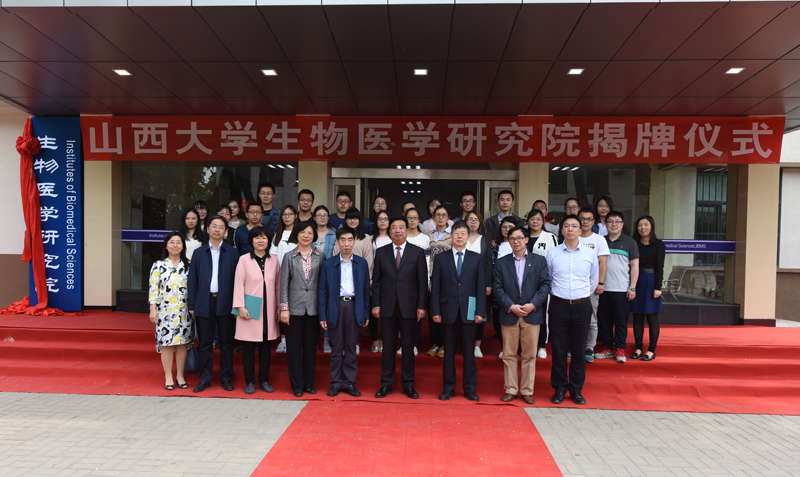

The Institutes of Biomedical Sciences (IBMS), Shanxi University, was started to preparation and design in March 2015 and is currently the fourth biomedical research institute in China and the first in the central and western regions. The IBMS of Shanxi University was initiated in response to China’s “13th Five-Year Plan” for the development of precision medicine and is actively promoted by the leadership of Shanxi University. It relies on the “Central Government’s Elevation of One Province, One University” initiative and focuses on building academic disciplines and research institutions with a distinct international character. Professor Changxin WU, a senior researcher at Cambridge University, is appointed as the founding director of the IBMS.
After more than a year of active preparation and construction, the institute had completed the basic laboratory construction, establishing a comprehensive laboratory system with 2700 m², including a series of molecular biology laboratories, cell biology laboratories, cell imaging laboratories, cell analysis and sorting laboratories, and a zebrafish center. Additionally, four biosafety level 2 laboratories and two biosafety level 2 plus (P2+) laboratories have been constructed. With support from the university and social organizations, a fully functional and advanced platform for life and medicine has been established, which is open to the entire university and Shanxi Province. The research institute has essentially built a series of research platforms and functional laboratories capable of supporting exploratory basic research and pioneering applied basic research. The team has successively recruited 14 high-level researchers with rich overseas research experience and 6 outstanding doctoral graduates from top domestic universities, achieving Shanxi University’s expectations in terms of both hardware construction and talent recruitment. The IBMS was officially launched on May 8, 2017, the 115th anniversary of Shanxi University, fully realizing its research functions.
The IBMS has both administrative and research institutions, with a director and an administrative director responsible for managing administrative and research activities. T The research system of the institute implements a responsibility research group principle investigator (PI) system, where researchers are composed of PIs from introduced talent and dual-appointed PIs from various departments and partner institutions. The IBMS has established an academic committee, a technology and resource committee, a graduate work group, a degree work group, and an ethics committee as part of its research management system.
The committees of IBMS, including the academic committee, graduate education committee, academic exchange committee, resource and technology management committee, and ethics committee, are responsible for planning the academic direction of the institute, facilitating academic exchanges, recruiting talent, conducting annual assessments, managing graduate admissions and training, overseeing external exchanges, and planning and evaluating equipment purchases, as well as managing and sharing equipment.
The purpose of establishing the IBMS is to address the needs of diagnosing and treating major human diseases and rare diseases, to explore the essence of life phenomena, to answer major scientific questions, and to innovate important technologies. By applying modern biology and related interdisciplinary methods and approaches, the institute aims to combine clinical needs with research, conducting research at three levels: fundamental, applied fundamental, and applied research, discovering new mechanisms, proposing new ideas, developing new drugs, and creating new solutions. It emphasizes innovation in technologies and drugs for the prevention, diagnosis, and treatment of major diseases, integrating research with production, and nurturing research through production, forming a virtuous cycle of industry-university-research collaboration.
Through the first five years of construction, the IBMS has initially formed a focus and preliminary advantages in three research fields: the pathogenesis and new intervention technologies for major infectious diseases and zoonoses (such as tuberculosis), the pathological mechanisms and gene therapy for high-incidence rare genetic diseases (metabolic and neurodegenerative diseases) in the central and western regions, and the mechanisms of stem cell differentiation and stem cell therapeutic technologies. The IBMS also addresses the economic development needs of Shanxi Province by conducting pioneering research and development on diagnostic and therapeutic technologies for diseases.
Relying on the research platforms and talent advantages of the IBMS, in 2022, it was approved by Shanxi Province to establish and pass acceptance of the "Shanxi Provincial Key Laboratory of Medical Molecular and Cellular Biology." By fully utilizing the institute's high level of internationalization, and promoting cooperation and exchanges with high-level universities in the West, in 2022, it was approved as a project by the Ministry of Science and Technology and the Ministry of Education to establish a local university "Intelligent Base for the Study of Pathological Mechanisms and New Intervention Technologies of Regionally Significant Diseases". The IBMS administrative office serves as a comprehensive functional department for administrative management. Under the direct leadership of the director of the IBMS, it implements various resolutions from the institute's joint administrative meetings. It is responsible for the comprehensive planning of administrative work, daily administrative affairs management, confidential secretarial work, information management, statistics, document printing, reception, liaison, and other tasks.
The public technical support platform is managed by high-level professionals responsible for the construction and management of a shared area of large scientific instruments, as well as training and onboarding of technical personnel and graduate students. The technical platform provides services to external users.
The IBMS in Shanxi University represents a significant reform attempt in the history of Shanxi University and serves as a pilot and special zone for the reform of research institutions. In terms of hardware strength, talent pool, and management operation, the institute has achieved a high level in the field of biomedical research. With continued support from Shanxi University and assistance from all sectors of society, the IBMS will continue to develop and grow, becoming a leading institution in the central and western regions and even nationwide in the field of basic research, applied research, and industry, playing an important role in improving the health level of Shanxi Province, the central and western regions, and the country.
Address: shanxi taiyuan basin city road 92 zip code: 030006 tel: 0351-7010255 Copyright shanxi university all rights reserved. All rights reserved: shanxi university For examination and approval of non-operational Internet information services (jin) ICP for 05000471 Webmaster@sxu.edu.cn